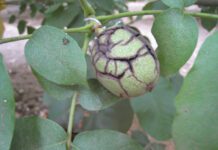
Routine inspections of farms and hullers continue under the Produce Safety Rule.
Inspectors from CDFA that come to an operation will want to see records and documentation that mandates in the Food Safety Modernization Act are being followed.
Priscilla Rodriguez, Western Ag Processor Association’s director of regulatory affairs and food safety, said employee training and sanitation are two key areas inspectors will be focusing on when they come to the farm. Rodriguez said small operations with more than $250,000 in average annual sales over the last three years and fall under the PSR may be inspected by CDFA. The inspections are announced and will be scheduled a week in advance.
“They will want to see that you are following rules concerning employee health,” Rodriguez said. Employee training records should include how employee illness is handled and reported to supervisors. Another area that will be inspected is employee restrooms. Those must be sanitized and fully stocked with soap, water and single use towels.
Rodriguez said the rules about cleaning farm equipment are not intimidating. The PSR rule asks that equipment that comes into contact with the food product be clean.
“You as the farm or huller determine the cleaning and/or sanitation schedule that is appropriate for your operation, depending on the activity.”
That might just be blowing dust and dirt off the harvest equipment and elevators with an air compressor to clean equipment. In the case of machinery that may be stored where it can become contaminated with bird or rodent droppings, the rule states that it must be sanitized with a product that can kill microorganisms.
The PSR also asks that a pre-harvest inspection of orchards take place. Any potential contamination must be removed prior to harvest and a buffer zone put in place around the site. Rodriguez said clean ups should be documented, although not required, so inspectors can see measures are being taken to prevent any contamination of food product.
Rodriguez emphasized that the CDFA inspectors will want to see records of training and cleaning activities. It is important that they have the date and time of an activity, how it was done and who carried it out. The records must also have a physical address of the farm. According to WAPA, inspection duration will be shorter if all documentation and records are prepared prior to the inspection.
















